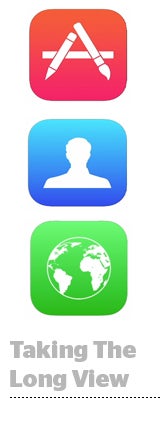 There’s no need to freak out, but content blocking in iOS 9 goes beyond the mobile web and in some cases will also apply to in-app advertising.
There’s no need to freak out, but content blocking in iOS 9 goes beyond the mobile web and in some cases will also apply to in-app advertising.
And that’s because of an in-app browsing mechanism in iOS 9 called Safari View Controller. It’s basically a more streamlined version of Apple’s current webview framework that developers use to display web content within their apps without forcing users to leave the native app experience – but with the content-blocking feature baked in
Some of the most popular apps in the App Store, Facebook, Twitter and Pinterest among them, use the iOS 8 version of Apple’s webview API to render clicked links.
That said, these older versions of webview have certain limitations.
For one, they don’t share cookies with mobile Safari. Apps using either version can’t autofill passwords or remember logins. There have also been certain performance and security issues over the years, including a troubling loophole that ostensibly allows developers to capture user data during the web authentication process.
Safari View Controller, which replaces webview in iOS 9, inherits all of the user-friendly functionality of desktop Safari, including autofill, persistent login between apps – and content blocking.
“Once a content-blocking extension is installed and activated, those rules are applied to any web page that loads inside Safari or Safari View Controller,” explained Sean Heber, a software engineer at The Iconfactory, a small software and design shop whose Twitter client app, Twitterrific, is adopting Safari View Controller for the iOS 9 version of its app.
In other words, content blocking in Safari View Controller works exactly the same way as content blocking for Safari mobile web browser – once a user opts to block, the objectionable content doesn’t even load in the first place.
“Safari View Controller inherits all the benefits of normal Safari by default,” said Dean Murphy, an independent app developer responsible for developing Crystal, one of the first content blockers for iOS 9, currently in beta.
As Ricky Mondello, a Safari and Webkit engineer, observed to an audience of developers at Apple’s 2015 WWDC in June: “What this means for you is, after you’ve switched your miniature web browser implementation over to Safari View Controller, you won’t get any complaints that your user’s ad blocker is not working. Pretty cool.”
While many advertisers and publishers might disagree with that last sentiment, in-app ad blocking in iOS 9 isn’t something to worry about just yet. There’s no indication that Apple plans to pull support for previous webviews in deference to Safari View Controller.
AdExchanger Daily
Get our editors’ roundup delivered to your inbox every weekday.
Daily Roundup
If Apple were to deprecate the iOS 8 webview, the app community would be thrown into chaos, said Alex Austin, CEO and founder of deep-linking startup Branch.
Thousands of app developers responsible for hundreds of thousands of apps use open source mobile development frameworks like PhoneGap or Cordova to build cross-platform apps for iOS and Android. Those developers rely on the old style webview to display a unified code base that works with both versions.
It’s not clear, however, if that same functionality will be available through Safari View Controller. And “if Apple took that away, it would be the end of a lot of apps,” said Austin, who regardless doesn’t see a “doomsday scenario” lurking. “I don’t believe it’s going to being widely adopted, at least for a couple of years,” he said.
While some apps, like popular messaging app Kik, which uses the traditional webview, are still on the fence about whether to institute Safari View Controller – according to Mike Roberts, head of messenger at Kik Interactive, the company hasn’t made its decision yet – others, including Twitterrific, are taking the plunge.
“Obviously not every app will adopt Safari View Controller immediately, but I suspect users will come to demand it eventually due to the increased consistency, access to their stored passwords, content blocking, etc.,” Heber said.
In terms of the actual content that users are looking to block, not all in-app advertising evokes the same, potentially negative, reaction from users, said Adam Ben-David, VP of platform at app monetization platform Supersonic, noting that rewarded video – a big revenue driver for most free-to-play apps – could be somewhat immune to the trend.
“Most users will likely be okay with keeping rewarded opt-in ads as they aren’t pushed in their face anyway, so they can ignore them already if they like,” Ben-David said. “It’s mostly banner [and] full-screen forced ads which users would like to get rid of.”
Safari View Controller can also be seen as another example of Apple’s drumbeat around privacy and data protection. It both supports SSL and maintains privacy around autofill by communicating with Safari’s cookie cache directly, rather than giving the host app access to that data.
“Safari View Controller runs in a separate process from your application, which categorically frees you from the responsibility of thinking about this important sensitive user data,” Mondello informed developers at WWDC 2015. “That’s on us.”













